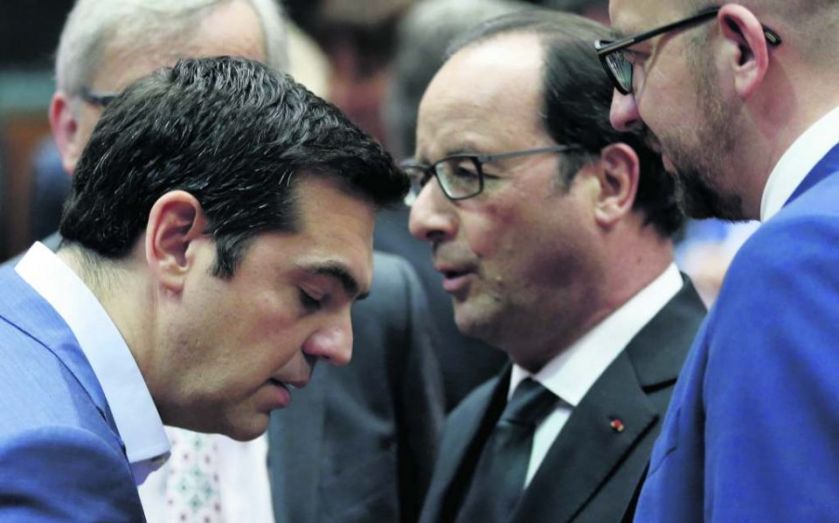Greek debt crisis: Greece squeezed by European demands

Greece was left stuck between a rock and a hard place last night after fellow European leaders urged its government to either push ahead with unpopular reforms, or accept a temporary – or permanent – exit from the Eurozone.
Strained talks carried on into the early hours of this morning, following a day of “tough, even violent” negotiations, according to one observer in Brussels.
The euro fell out of bed in Asian trading, printing 1.109 against the greenback, down sharply from 1.115 when the market opened.
In order for it to give funding for a third bailout, the Eurogroup wants Greece to pass a number of reforms into law by Wednesday, including streamlining VAT, broadening the tax base and a pensions overhaul.
Further reforms and privatisations would be expected in the coming weeks, while officials from Greece’s creditors would go to Athens to oversee the implementation of the plan.
Any deal from the Eurogroup will not let up pressure on Greek Prime Minister Alexis Tsipras who faces a very divided Syriza government back in Athens, with its allergy to austerity making any brokered plan’s ratification a political nightmare.
“What is at play here is an attempt to humiliate Greece and Greeks, or to overthrow the Tsipras government,” said Dimitrios Papadimoulis, a Syriza member of the European Parliament.
German officials increased pressure on the struggling Mediterranean country, and raised more than a few eyebrows, by proposing that €50bn of Greek assets to be privatised should be moved to a fund in Luxembourg. Revenue from the sale of such assets would pay down Greece’s debt, a leaked document said.
Sensationally, one proposal raised the prospect, that Greece take a five-year “time-out” from the Eurozone.
“Greece should be offered swift negotiations on a time-out from the euro area, with possible debt restructuring,” the package of proposals states. It has now been dismissed.
Adding to the sense of farce, reports last night quoted bankers in Greece saying that no conversations have taken place regarding what might happen if the country is forced out of the single currency.
French President Francois Hollande, Greece’s strongest ally in the Eurozone, dismissed the notion, and said it would start a dangerous unravelling of EU integration.
“There is no such thing as temporary Grexit, there is only a Grexit or no Grexit. There is Greece in the Eurozone or Greece not in the Eurozone,” he said.
THE GREEK CRISIS: HOW DID WE GET HERE?
9 DECEMBER
The New Democracy government led by Antonis Samaras calls a snap presidential election after political pressure from the Syriza party, which rapidly gains popularity after five years of economic turmoil that Greeks blame on their bailout programme. The Greek stock market suffers its biggest crash since the 1980s.
29 DECEMBER
A third and final attempt to elect a president fails, leading to a snap general election. A slow motion bank run begins as depositors begin moving their money out of Greek banks.
25 JANUARY
Syriza is elected on the promise it will end austerity and keep the euro as Greece’s currency. It begins negotiating with the country’s creditors through the Eurozone’s finance ministers, with the aim of softening the conditions of its bailout programme that require it to undertake unpopular reforms.
20 FEBRUARY
Finance ministers agree to Greece’s bailout to the end of June while negotiations take place. The deal guarantees support from Europe for Greece’s banks as they face withdrawals.
28 APRIL
As talks between Greece and Europe stall, pressure grows on Greece’s banks and its state finances with speculation mounting over whether it will be able to pay its debts. The Greek negotiation team is reshuffled which many interpret as an attempt to sideline firebrand finance minister Yanis Varoufakis. Markets reacted positively to the news.
4 JUNE
As it runs low on cash, Greece notifies the International Monetary Fund that it will delay €1.5bn (£1.1bn) of payments due throughout June and pay in one bundle at the end of the month.
27 JUNE
Four months of negotiations prove fruitless after a failure to bridge differences on pension and wage cuts and tax hikes. A referendum on the latest proposal offered up by creditors is announced. Europe cuts off support to Greek banks, which close to avoid running out of cash as ATM withdrawals are capped at €60 a day.
30 JUNE
Greece misses a €1.5bn payment to the International Monetary Fund and its bailout programme expires meaning it can not be extended. A new one must be drawn up.
5 JULY
Greeks overwhelmingly vote “no” to the plan from creditors, which Prime Minister Alexis Tsipras says will give them more bargaining power in talks. Varoufakis steps down as finance minister and is replaced by Oxford-educated Euclid Tsakalotos in a bid to ease tensions with Europe as negotiations continue.